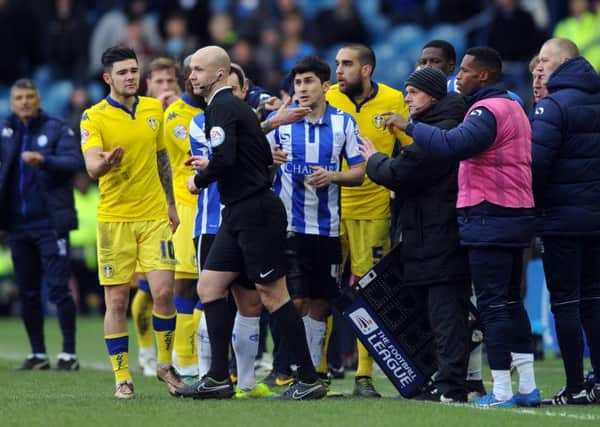Are football commentators too harsh on referees? Maybe not, new research shows


A study carried out at the University of Portsmouth found that professional pundits don’t make as many negative comments about referees’ actions as is believed.
‘The negative comments were minimal compared to the positive or neutral comments. That was really unexpected.’
Advertisement
Hide AdAdvertisement
Hide AdInterviews with referees in previous academic studies found that match officials believed the media was responsible for much of the pressure they felt.
Dr Webb’s study found that post-match analysis was more critical of referees’ performances, but these negative comments were reserved for an error which was obvious and was thought to have affected the outcome of the game.
The sport scientist also carried out interviews with people working in sports media, and found that views about the standards and quality of Premier League refereeing were generally positive.
He said: ‘The pressure that referees find themselves under today is unprecedented. Matches tend to be determined as much on decisions about tenuous penalty kicks or marginal offside decisions as on the superior play of one team.
Advertisement
Hide AdAdvertisement
Hide Ad‘These refereeing decisions can be pivotal for a team’s prospects of winning championships, qualifying for lucrative European competitions or avoiding relegation.
‘But the pressure that referees believe they are under is not an accurate reflection of the current environment.’
Dr Webb broke down discussion during the 20 matches into four categories, with the following results:
*Neutral comments: 113 incidents (41.85 per cent)
*Positive comments: 69 incidents (25.56 per cent)
*Comments questioning the referee’s action: 59 incidents (21.85 per cent)
*Negative comments: 29 incidents (10.74 per cent)
Advertisement
Hide AdAdvertisement
Hide AdDr Webb said: ‘There is an acceptance that mistakes can and will be made, but that referees are trying to do their best under difficult circumstances. Comments recorded during live broadcasts also supported this.’
He believes referees’ perception of the pressure they are under can lead to errors in performance, increased tension before matches and worries about making wrong decisions.
Knowing that this perception is not borne out by the statistics could therefore help ease the pressure they feel, resulting in fewer errors on the pitch.
‘If there is to be an improvement in the relationship between referees and the media there are a number of discussions required, as well as a greater degree of understanding, particularly from those within refereeing to ensure that the reduced pressure identified here is communicated.’
Advertisement
Hide AdAdvertisement
Hide AdBy contrast, an online survey carried out by University of Portsmouth in collaboration with Loughborough and Edge Hill universities found that verbal abuse towards referees is rife.
Sixty per cent of respondents reported being verbally abused at least every couple of games.